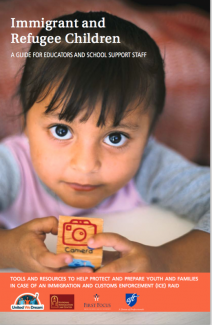First Focus is proud to partner with the American Federation of Teachers, the National Immigration Law Center, and United We Dream in the release of a new guide for teachers, school personnel, and service providers on how they can help prepare refugee and immigrant children for the possibility of an immigration raid and other enforcement actions. The guide provides an overview of refugee and immigrant students, the immigration enforcement system, and strategies for helping students and families at risk of being impacted by a raid. Examples of how educators and schools can help advocate for their students are also provided. 
In recent months, educators from around the country have been urging the Obama Administration to rethink its dangerous policy of using immigration raids to apprehend and deport recently arrived Central American mothers and children, including youth who entered the U.S. as unaccompanied children and recently turned 18. It has been reported that some of these youth were apprehended by ICE on their way to school.
Classmates, teachers, and communities have also been rallying on ICE to release youth who have been detained and to halt their deportation. Such youth include Wildin Acosta from North Carolina and Kimberly Pineda Chavez from Georgia, both students who came to the U.S. seeking refuge from gang violence in Central America and had just started to build a new life here.
Current Immigration and Customs Enforcement (ICE) policy restricts immigration enforcement actions in or near sensitive locations (such schools, hospitals, churches), but failure of government officials to provide clarity and guidance on the policy has led schools, including the LA school district and Durham Association of Educators, to adopt their own resolutions banning ICE from their classrooms.
The recent raids are part of a larger strategy by the Obama Administration to attempt to deter migration flows from Central America, despite consistent evidence that the mothers and children fleeing the region are doing so to seek protection. Earlier this year, the Obama Administration launched a series of home raids to apprehend and deport recently arrived Central American mothers and children who had been issued final removal orders. In the first round of raids, families were terrorized in their homes at night, with 121 mothers and children apprehended in Georgia, Texas, and North Carolina.
The Administration’s promise for more to come have created a climate of fear among whole communities, adversely impacting student attendance and performance. Several teachers have shared that in addition to not showing up to school, immigrant and US citizen children alike have demonstrated heightened levels of anxiety, including digestive problems, difficulty concentrating, and visible distress. According to a 2010 report by the Urban Institute, children who witnessed parents or family members apprehended in a home raid were much more likely to experience symptoms of Post-Traumatic Stress Disorder (PTSD) than children whose parents were arrested in other settings.
As these raids continue, educators play a critical role in providing information to their students and families. This guide is designed to provide educators with the tools they need to protect their students as well as help them to advocate for their classrooms to remain safe spaces where all children can focus on learning.